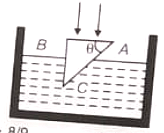Two thin similar convex glass surfaces are joined together front to front with its rear portion silvered such that a sharp image of an object at infinity is formed 20 cm from the mirror. When the air between the glass pieces is replaced by water , then the image formed from the mirror is at a distance of: (Thickness of lens is negligible.)

(1) 8 cm
(2) 10 cm
(3) 6 cm
(4) 12 cm

A convex lens of focal length 100 cm and a concave lens of focal length 10 cm are placed coaxially at a separation of 90 cm. If a parallel beam of light is incident on the convex lens, then after passing through the two lenses, the beam:
(1) Converges
(2) Diverges
(3) Remains parallel
(4) Disappears
Yellow light is refracted through a prism producing minimum deviation. If i1 and i2 denote the angle of incidence and the angle of emergence for the prism respectively, then:
(1) i1 = i2
(2) i1 > i2
(3) i1 < i2
(4) i1 + i2 = 90
At what angle will a ray of light be incident on one face of an equilateral prism, so that the emergent ray may graze the second surface of the prism ?
(1) 30o
(2) 90o
(3) 45o
(4) 60o
A prism of the refractive index has a refracting angle of 60o. At what angle must a ray be incident on, so that it suffers a minimum deviation?
(1) 30o
(2) 45o
(3) 60o
(4) 75o
A glass prism of refractive index 1.5 is immersed in water of refractive index 4/3. A light ray incident normally on face AB is totally reflected at face AC if:

(1)
(2)
(3)
(4)
An astronomical telescope has an objective of focal length 100 cm and an eyepiece of focal length 5 cm. The final image of a star is seen 25 cm from the eyepiece. The magnifying power of the telescope is:
(1) 20
(2) 22
(3) 24
(4) 26
When a telescope is adjusted for normal vision, the distance of the objective from the eye-piece is found to be 80 cm. The magnifying power of the telescope is 19. What are the focal lengths of the lenses?
(1) 61 cm, 19 cm
(2) 40 cm, 40 cm
(3) 76 cm, 4 cm
(4) 50 cm, 30 cm
The focal lengths of the objective and eye lens of a telescope are respectively 200 cm and 5 cm. The maximum magnifying power of the telescope will be
(1) - 40
(2) - 48
(3) - 60
(4) - 100
The focal length of a planoconvex glass lens is 20 cm . The plane face of it is silvered. An illuminating object is placed at a distance of 60 cm from the lens on its axis along the convex side. Then the distance (in cm) of the image is:
(1) 20
(2) 30
(3) 40
(4) 12






